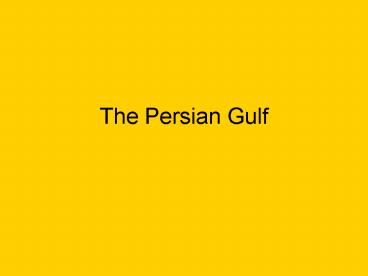The Persian Gulf - PowerPoint PPT Presentation
1 / 15
Title:
The Persian Gulf
Description:
The Persian Gulf Natural Environments Countries included here are: Saudi Arabia, Bahrain, Kuwait, Oman, Qatar, the United Arab Emirates, and Yemen. – PowerPoint PPT presentation
Number of Views:182
Avg rating:3.0/5.0
Title: The Persian Gulf
1
The Persian Gulf
2
Natural Environments
- Countries included here are
- Saudi Arabia, Bahrain, Kuwait, Oman, Qatar, the
United Arab Emirates, and Yemen. - This region is also referred to as the Middle
East.
3
Natural Environments
- Tectonic forces have shaped the physical features
of this region. - There is a mixture of rugged mountains, upland
plateaus, and valleys. - Plate movement has also created narrow gulfs and
seas, which are bordered by coastal plains.
4
Natural Environments
- There are also frequent earthquakes in the area.
- To the north and east of the Arabian Peninsula is
a region called Mesopotamia. - This is located mostly in Iraq and is a wide
plain through which two great rivers flow.
5
Natural Environments
- These two rivers are the Tigris and the
Euphrates. - They are exotic rivers, or rivers that begin in
humid regions and then flow across dry areas.
6
Climates, Plants, and Animals
- Hot and dry climates dominate the region.
- Rain comes mostly during the winter due to the
westerly winds of the middle latitudes. - The southern interior is mostly uninhabited
desert called the Rub-al-Khali.
7
Climates, Plants, and Animals
- The regions mountains provide water to the
valleys below. - An orographic effect produces these more humid
climates. - The regions wettest climate is in Iran in a
narrow zone along the southern shore of the
Caspian Sea.
8
Climates, Plants, and Animals
- The lowlands of Saudi Arabia along the Persian
Gulf are among the hottest places in the world. - Because of the subtropical high pressure with
clear skies and little shade, the temperatures
often climb above 114 degees.
9
Climates, Plants, and Animals
- Little rain here, but since it is close to the
sea, the humidity is high. - There are mountain regions near here though that
people can escape to get away from the heat.
10
Climates, Plants, and Animals
- Shrubs and grasses cover the regions wide dry
plains. - Trees are common only in mountain regions and the
usually dry streambeds. - The highest plains are grasslands.
11
Climates, Plants, and Animals
- In the driest areas the ground is bare rock and
sand. - In some areas the soil is so salty plants cant
grow. - Nearly all the regions plants have adapted to
surviving long periods of time with no water.
12
Climates, Plants, and Animals
- There are few large animals left in the region
due to hunting from humans and competition from
other large animals. - Camels, donkeys, lizards, and poisonous snakes
are common in the region.
13
Natural Resources
- The regions two most important resources are oil
and water. - The Tigris and Euphrates Rivers are the main
sources of water in Iraq. - Canals lead away from the rivers bringing water
to the surrounding areas.
14
Natural Resources
- Most farmers depend on rain for agriculture.
- Surface water is rare in the desert areas. Only
found at an oasis. - Sea water to fresh water?
15
Natural Resources
- Oil is the regions most valuable resource.
- The oil reserves along the Persian Gulf are the
largest in the world. - The region has few other resources though for
developing industry.































